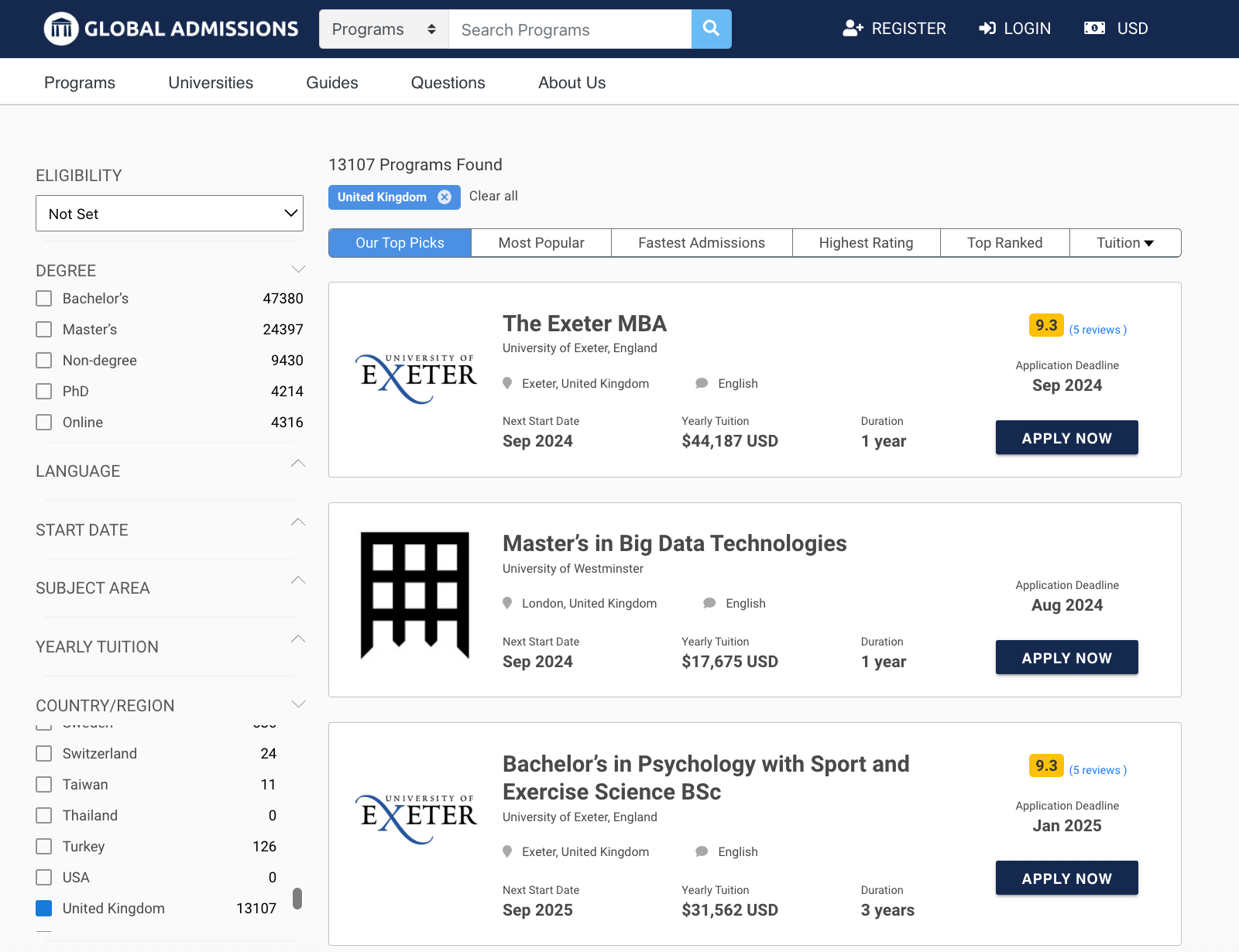“It doesn’t matter whether you went to college or not. What matters is if you’re smart and get things done.” – Mark Cuban (Billionaire Entrepreneur)
I’m founder of a study abroad company.
We specialise in helping international students apply to university abroad.
Why am I writing an article about this topic?
Because everyone should consider if they really need to go to university.
I’d argue that not everyone should go to university, and you should seriously consider not going to university.
In the digital age, you don’t need to go to university to be successful.
It’s not just because you can learn everything online, or by reading books.
And it’s not because after 3-4 years you might just be in the same position, with no guarantee of a job, and you’re in some debt.
I’d also argue that if you can’t get into a top university, it might be even better to consider your other options to get ahead.
And did you know that many of the most successful people like Bill Gates, and Mark Zuckerberg dropped out of university anyway?
Here’s why:
The traditional belief that a university degree is the key to a fulfilling and prosperous career is being challenged. While higher education has value, it’s not the sole path to success. Here are 100 reasons why you can thrive without a traditional college degree:
Alternative Paths to Skill Development
- Trade Schools & Apprenticeships: Learn a skilled trade (plumbing, electrical, HVAC) with high earning potential.
- Coding Bootcamps: Gain in-demand tech skills in a shorter, more intensive format.
- Online Courses & Certifications: Upskill in specific areas (marketing, web design) affordably.
- Military Service: Develop skills, discipline, and may offer educational benefits afterward.
- Mentorships & Internships: Gain real-world experience and make valuable connections.
- Self-Directed Learning: Libraries, online resources, and self-study offer limitless knowledge.
- Volunteering: Build skills, network, and contribute to your community.
Entrepreneurial Mindset
- Start a Business: Turn your idea into reality without waiting for a “formal” qualification.
- Freelancing: Offer your skills (writing, design, etc.) directly to clients on freelance platforms.
- “Side Hustles”: Monetize hobbies, from crafting to dog walking, building skills and income.
- Become an Influencer: Grow a niche following and monetize your content or expertise.
- Network and Collaborate: Partnerships can open up opportunities unavailable to solo workers.
In-Demand Skills That Don’t Require Degrees
- Sales Experts: Persuasive personalities can secure high-paying jobs in many industries.
- Skilled Construction Workers: Carpenters, electricians, etc., are essential and well-paid.
- Commercial Truck Drivers: With certifications, long-haul trucking offers decent pay.
- Web Developers: Bootcamps or self-study can lead to lucrative careers.
- Social Media Managers: Businesses need help navigating online platforms.
- Cybersecurity Specialists: Self-study and certifications can make you valuable.
- Real Estate Agents: Driven individuals can succeed in property sales with the right licensing.
- Data Analysts: Learn Excel and data tools to find insights businesses need.
Financial Considerations
- Avoid Student Loan Debt: Graduate without the burden, allowing you to invest in your future sooner.
- Start Earning Sooner: Get a jump-start on income while your peers are still in school.
- Practical Work Experience: May be valued higher by some employers than a theoretical degree.
- Opportunity Cost: Consider the lost earnings during years spent on a degree.
Advantages of a Non-Traditional Path
- Find Your Passion Faster: Real-world experience reveals what you love quickly.
- Discover Your Strengths: Succeeding outside academia builds unique confidence.
- Follow Your Own Timeline: No need to stick to a rigid 4-year plan.
- Individualized Learning: Focus on skills directly applicable to your desired career.
- Resilience and Resourcefulness: Navigating your own path develops valuable traits.
- Stand Out From the Crowd: Your unconventional path makes you a memorable job candidate.
-
Focus on a Niche Skill: Master a specific skill and become highly sought-after, bypassing generic degrees.
-
Network Strategically: Meaningful relationships within your field can outweigh a degree.
-
Become a Certified Specialist: Many industries have valuable certifications requiring less time/money than college.
-
Start Investing Earlier: No debt and early income boost your potential to build wealth or fund future ventures.
-
Become an Expert Blogger/Vlogger: If you love a niche, build an authority platform and monetize expertise.
-
Create and Sell Online Courses: Share your knowledge and earn passive income.
-
Join a Startup: Get in on the ground floor of a high-potential company and learn as it grows.
-
Learn Negotiation Skills: These can make you more valuable than a piece of paper in some roles.
-
Find a Company That Funds Education: Some businesses will pay for relevant training as you work.
-
Build Your Personal Brand: A strong online presence and reputation can open career doors.
-
Travel Extensively: Cultural immersion cultivates adaptability, problem-solving, and fresh perspectives.
-
Teach English Abroad: Earn income, gain experience, and see the world.
-
Learn a Second (or Third) Language: A marketable asset for careers spanning global business to translation.
-
Au Pair/Nannying: Childcare experience builds responsibility and can include room, board, and global travel.
-
Work in the Service Industry (Wisely): Develops people skills and can be lucrative in the right settings.
-
Become a Licensed Massage Therapist: A growing field with flexible career options.
-
Get into Real Estate Investing: Learn the skills to flip houses or manage rentals.
-
Pursue Your Artistic Talents: Musicians, performers, and artists can forge fulfilling paths.
-
Become a Professional Trainer: If you are passionate about fitness, certifications can lead to a career.
-
Work in Sales for a Product You Believe In: Passion combined with salesmanship is a powerful combination.
-
Explore the Gig Economy: Task-based platforms offer flexibility and varied experience.
-
Join the Nonprofit World: Discover mission-driven work that develops leadership and other valued skills.
-
Find a Mentor Early On: Guidance from those succeeding in your desired field is invaluable.
-
Develop a Positive “Can-Do” Attitude: Enthusiasm and work ethic impress more than some diplomas.
-
Become a Problem-Solver: Businesses value those who proactively address issues.
-
Embrace Continuous Self-Improvement: Never stop learning and developing new abilities.
-
Take Calculated Risks: Smart gambles can lead to greater rewards than always playing it safe.
-
Don’t Fear Failure: Successful people view setbacks as stepping stones to improvement.
-
Find Joy in Your Work: Meaningful work beats a fancy title that makes you miserable.
-
Build a Strong Work Ethic: Reliability and a willingness to go above and beyond are always in demand.
-
Network Within Your Community: Local connections can yield apprenticeship or entry-level job opportunities.
-
Join Professional Organizations: Build relationships and access resources in your desired field.
-
Attend Industry Conferences & Events: Network and stay updated on trends.
-
Leverage Your Unique Background: Your life experiences shape your strengths, make them work for you.
-
Embrace Failure as Learning: Mistakes are how we grow and improve.
-
Be Your Own Best Advocate: No one will champion your career as passionately as you.
-
Learn the Art of Self-Promotion: Highlight your abilities effectively, without arrogance.
-
Cultivate Time-Management Skills: Succeeding independently requires discipline and organization.
-
Develop Excellent Communication: Articulating your ideas clearly is crucial in any professional setting.
-
Know Your Worth: Don’t undersell yourself just because you lack a traditional degree.
-
Tap into Online Job Boards: Many focus on experience-based and non-degree hiring.
-
Prioritize Portfolio Building: Showcase your skills with tangible projects or work samples.
-
Explore the World of Freelance Platforms: Platforms like Upwork and Fiverr offer diverse opportunities.
-
Find Communities for Those on Non-Traditional Paths: Connect for advice and support.
-
Become a Master at Self-Marketing: Learn to communicate your value proposition effectively.
-
Focus on Transferable Skills: Skills honed in one area often apply to others, highlight these.
-
Build a Strong Online Presence: LinkedIn, a website, or blog can give potential employers a sense of your work.
-
Get Involved with Your Community: Volunteer work builds positive reputation signals and your network.
-
Embrace the “Side Hustle” Mentality: Even small projects add up to experience and income.
-
Seek Out Short-Term or Contract Work: Build your resume and gain new skills.
-
Consider “Temp to Perm” Positions: Temporary positions can become long-term if you impress.
-
Learn Basic Accounting and Finance: Useful for entrepreneurs and even for managing personal finances.
-
Master Digital Marketing Skills: Businesses of all sizes need help with online strategies.
-
Create and Sell Digital Products: Ebooks, templates, or stock photos can generate income.
-
Monetize a Hobby or Passion: What you love doing in your spare time might become income.
-
Learn to Code (Even the Basics): Coding literacy is increasingly valuable across industries.
-
Take Advantage of Free or Low-Cost Education: Many online resources can boost your knowledge.
-
Consider a Part-Time Degree Later: Start working, gain experience, and maybe finish your degree strategically.
-
Don’t Let Age Hold You Back: Success without a degree is possible at any stage of your life.
-
Focus on Your Health & Wellness: Success is easier when you have the energy and clarity of mind.
-
Cultivate Grit and Determination: Perseverance will take you far.
-
Stay Coachable and Open to Feedback: A willingness to learn is admired by potential employers.
-
Become a Lifelong Learner: Never stop reading, taking courses, or seeking new knowledge.
-
Seek Out Diverse Perspectives: Surround yourself with those from different backgrounds and life paths.
-
Develop Strong Emotional Intelligence: Self-awareness and empathy are valuable in any career.
-
Master the Art of Storytelling: Learn to communicate your experiences in a compelling way.
-
Practice “Strategic Job Hopping” Early On: Gaining diverse experiences rapidly can fast-track success.
-
Find a Way to Give Back: Mentorship or volunteering enhances your own growth and opens up opportunities.
-
Don’t Be Afraid to Ask for Help: Reach out to those in your network for guidance.
-
Believe in Yourself: Confidence and self-belief are essential to navigating a non-traditional path.
Important notes:
- Success is Multifaceted: Define it for yourself – it’s not just about salary.
- Research is Key: Investigate alternative paths thoroughly before deciding.
- Hard Work is Non-Negotiable: Degrees aren’t magic; success takes effort regardless of the route.
- Lifelong Learning Matters: Stay curious, keep building skills throughout your career.
Are you interested in studying abroad? Check out our platform for more options.
Did you know it might be much easier to get into a top university abroad than your home country?
Many countries have different systems for international students which are less competitive than your home country.
Global Admissions
You can learn more about studying abroad and apply online on Global Admissions.
“Formal education will make you a living; self-education will make you a fortune.” – Jim Rohn (Entrepreneur and author)

